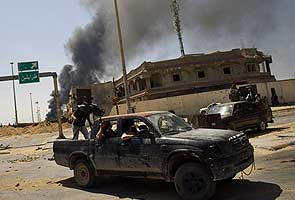
The targeted compound included the state television building and a Libyan official alleged the strikes were meant to kill Gadhafi. However, the TV building was not damaged and Gaddhafi spoke from an undisclosed location.
Since the start of the uprising against him in February, Gaddhafi has made only infrequent public appearances. In his rambling pre-dawn speech, he appeared both subdued and defiant, repeatedly pausing as he flipped through handwritten notes.
"The door to peace is open," Gaddhafi said, sitting behind a desk. "You are the aggressors. We will negotiate with you. Come, France, Italy, U.K., America, come, we will negotiate with you. Why are you attacking us?"
He said Libyans have the right to choose their own political system, but not under the threat of NATO bombings.
Rebel leaders have said they will only lay down their arms and begin talks on Libya's future after Gaddhafi and his sons, some of whom hold powerful positions in the country, step aside. Gaddhafi has repeatedly refused to resign.
Saturday's pre-dawn air strikes targeted a government complex, and reporters visiting the scene were told two damaged buildings housed a commission for women and children and offices of parliamentary staff.
One of at least three bombs or missiles knocked down a huge part of a two-story Italian-style building. In another building, doors were blown out and ceiling tiles dropped to the ground. One missile hit the street outside the attorney general's office, twisting a lamppost and gouging out a crater.
A policeman said three people were wounded, one seriously.
In his speech, Gaddhafi lamented the air strikes, which began in mid-March under a U.N. mandate to protect Libyan civilians. The strikes have mainly hit Libyan military targets, but three did hit Gadhafi's residential compound.
"Why are you killing our children? Why are you destroying our infrastructure," Gaddhafi said Saturday, while denying that his forces had killed Libyan civilians.
Just hours earlier, however, government forces shelled the besieged rebel city of Misrata, killing 15 people, including a 9-year-old boy, hospital doctors said. The city of 300,000 is the main rebel stronghold in western Libya and has been under siege for two months.
The port is Misrata's only lifeline. On Friday, NATO foiled attempts by regime loyalists to close the only access route to Misrata, intercepting boats that were laying anti-ship mines in the waters around the port.
The regime signaled Friday that it is trying to block access to Misrata by sea.
Moussa Ibrahim, the Libyan government spokesman, said he was unaware of the attempted mine-laying. However, he said the government is trying to prevent weapons shipments from reaching the rebels by sea. Asked whether aid vessels would also be blocked, he said any aid shipments must be coordinated with the authorities and should preferably come overland.
Gadhafi's forces have repeatedly shelled the port area and his ground troops are deployed on the outskirts of Misrata, after having been driven out of the downtown area by the rebels last week.
With the rebels holding much of eastern Libya, Gaddhafi needs to consolidate his hold over the western half, including Misrata and a mountainous region on the border with Tunisia.
On Friday, fighting between rebels and regime loyalists over a key border crossing spilled over into Tunisia, drawing a sharp rebuke by Tunisian authorities. The Foreign Ministry summoned Libya's ambassador to convey its "most vigorous protests" for the "serious violations" at the Dhuheiba border area Thursday and Friday, a ministry statement said.
The crossing is a strategic lifeline for Libya's western Nafusa mountain area where members of the ethnic Berber minority -- who have complained of systematic discrimination by the regime -- have been fighting the Gadhafi's forces for several weeks.
Elements of Libyan government forces crossed the border following the fighting with the rebels, prompting the Tunisia army to mount searches for them in the frontier town Dhuheiba.
At one point Friday, 15 Libyan military vehicles, carrying troops armed with anti-aircraft guns and rocket launchers, were spotted in Dhuheiba. Town resident Mohammed Hedia said local civilians and the families of Libyan rebels who had been staying there set upon the Gaddhafi troops, creating a "chaotic situation."
The Tunisian army stopped "several members of Gadhafi's brigades, regrouping them and leading them back to Libyan territory," the Tunisian Defense Ministry said, according to TAP.
The Tunisian news agency, citing military officials, said dozens of Libyan troops and rebel fighters were killed in the two-day battle over the Dhuheiba crossing which ended with rebels regaining control Friday, after Libyan forces held it for a day.
Ibrahim, the Libyan spokesman, confirmed that Libyan troops had fled into Tunisia, running from the rebels. He said Libyan authorities were in touch with their Tunisian counterparts.
Thousands of residents of the mountain area have fled to Dhuheiba and other Tunisian border towns. TAP said thousands more Libyan refugees streamed into Tunisian overnight.


No comments:
Post a Comment